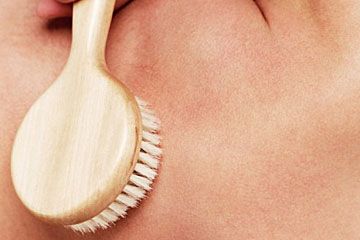Americans spent more than $2 billion on deodorants and antiperspirants in 2006, according to the market research firm Euromonitor International. Do we really think we smell that much? Maybe yes, maybe no. Maybe we're not using the right products. Keep this in mind: Deodorants keep us from smelling while antiperspirants keep wetness under control. Together they work best: Less sweat --thanks to antiperspirant -- on your skin means less sweat for hungry bacteria to break down and metabolize, which means less body odor. The odor that does sneak through --an antiperspirant won't stop all the wetness -- can be controlled by deodorant.
Some deodorants mask odor with fragrances. Others boast ingredients that reduce the number of bacteria living on the skin -- triclosan is the magic ingredient in your stick of deodorant and deodorant soap that makes them antibacterial. It and its partner triclocarbon are antimicrobial agents that inhibit the growth of bacteria and other microbes on your skin. They can be found in everything from different toothbrushes and toothpastes -- to keep gingivitis at bay -- to some brands of socks and paint. Surgical scrubs, preservatives and pesticides are other uses for Triclosan. It's also the active ingredient in many popular deodorants.
Advertisement
Most people using deodorant will grab a stick, gel or spray -- but what about deodorant soaps? Deodorant soaps that claim to be antibacterial often also contain triclosan or triclocarbon like their solid deodorant counterparts. Triclosan works as an antimicrobial by blocking an enzyme called enoyl-ACP (acyl-carrier protein) reductase (also known as ENR) in microorganisms, an enzyme that bacteria need for fatty acid synthesis, which is used for creating cell membranes. Without it, the bacteria can't reproduce.
While the fragrance in your deodorant soap may smell nice, that smell may be the only substantial benefit from a good lathering. While triclosan does curb the growth of bacteria, current studies suggest no benefit from using antibacterial soaps over plain soaps, whether for infection prevention or reducing the amount of bacteria on the skin (remember this is what's going to help control your body odor). Researchers at the University of Michigan, Tufts University School of Medicine and Columbia University found that soaps with the active ingredient triclosan didn't perform any better than regular soaps when they compared how well the two knocked out the number of bacteria on the skin of healthy people [source: Aiello]. So, despite marketing claims to the contrary, deodorant soap's only benefit over regular soap is the fragrance that covers up your body odor.
Finally, when deciding what form of deodorant is right for you, it's important to note that the U.S. Food and Drug Administration is currently reviewing triclosan and triclocarbon for their possible contribution to bacterial resistance to antibiotics. They may help to create "superbugs" from bacteria they don't kill and be linked with hormone disruption in humans. This makes a little body odor seem not so bad.
Advertisement



